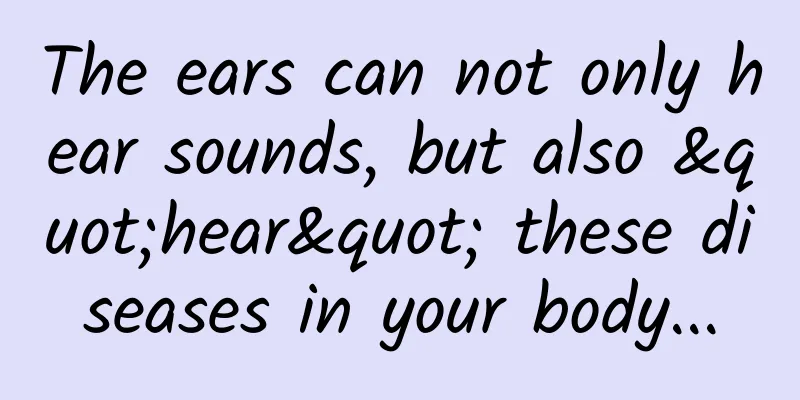The ears can not only hear sounds, but also "hear" these diseases in your body...

|
Three days ago, 51-year-old Mr. Li suddenly developed tinnitus and intermittent buzzing sounds in his ears that lasted for several minutes. He did not pay attention to it at first, but the tinnitus reappeared yesterday and lasted for a long time. He was very irritable, so he came to the ENT department of the hospital for treatment. The doctor conducted relevant examinations on Mr. Li, such as hearing screening, ear CT, etc., and no obvious abnormalities were found. Subsequently, Mr. Li's blood pressure was measured and found to be as high as 156/100 mmHg. It was suspected that the tinnitus was caused by hypertension, so he was transferred to the cardiology department for treatment. After referral, Mr. Li's blood pressure was measured again, the result was 156/102 mmHg, and he was conscious and in good spirits, his heart was not too large and his heart rhythm was regular, no pathological murmurs were heard in the auscultation areas of the valves, basic physiological reflexes were present, and no pathological signs were elicited. Based on the above examination results, Mr. Li was preliminarily diagnosed with hypertension and hospitalization was recommended . During the hospitalization, his blood routine, liver and kidney function, blood sugar, blood lipids, electrocardiogram and other examination items were completed, and no abnormalities were found. Cardiac color ultrasound showed thickening of the ventricular septum. Mr. Li's blood pressure was measured continuously at several intervals afterwards, and the values were all around 150/100 mmHg. He was eventually diagnosed with stage 2 hypertension . After active drug treatment and improved lifestyle, Mr. Li's tinnitus symptoms basically disappeared, and his blood pressure gradually decreased and stabilized. Doctors remind: Hypertension is a common disease among middle-aged and elderly people. Most patients have no symptoms in the early stages, so it is difficult to detect, but some patients occasionally experience symptoms such as dizziness, headache, blurred vision, tinnitus, and insomnia. When tinnitus occurs suddenly, you must be vigilant, seek medical attention promptly, identify the cause, and try to minimize the damage caused by tinnitus to your body. Because the ears are hidden from people's sight, they are often not taken seriously. However, few people know that if there is any discomfort in the body or any damage to the organs in the body, it can be detected through the ears. When these 6 abnormalities appear in the ears, they may be the "whistleblowers" of certain diseases, so don't just ignore them. 01Unexplained ear pain Warning: Temporomandibular joint disorder syndrome Earache is a common symptom in ear medicine, which is often seen in auricular diseases, external auditory canal diseases, middle ear diseases, etc., such as external otitis, ear trauma, perichondritis, suppurative otitis media... But if you suddenly experience unexplained ear pain , you should be alert, as it may be a manifestation of temporomandibular joint disorder syndrome. The joint connects the lower forehead bone to the bone in front of the ear, and disease in the joint may cause ear pain when chewing, talking, or opening the mouth wide. Many patients visit the outpatient clinic due to ear pain, only to find that there is nothing wrong with their ears and the real cause may be in the jaw. The most important measures for pain in the TMJ area are as follows: Avoid eating hard food. Avoid opening your mouth wide to reduce irritation to the joints and muscles. When applying local hot compress, be sure to ensure that the joint area is hot for more than 6 hours a day, which can often achieve good results. 02Tinnitus Beware: Multiple physical and mental illnesses Many people think that tinnitus is simply a problem with the ears, but in fact, tinnitus is a systemic disease. Diseases of the auditory system, some systemic diseases other than the auditory system, psychological problems or diseases, etc. can all cause tinnitus. Auditory system diseases: such as cerumen blockage, tumors or foreign bodies in the external auditory canal; various inflammations of the middle ear, otosclerosis; Meniere's disease of the inner ear, sudden deafness, noise-induced deafness, presbycusis, etc. Systemic diseases: cardiovascular and cerebrovascular diseases , such as hypertension, dyslipidemia, arteriosclerosis, hypotension, etc.; autonomic dysfunction, mental stress, depression , etc.; endocrine diseases , such as abnormal thyroid function, diabetes, etc.; others include neurodegeneration, inflammation (viral infection), trauma, drug poisoning, cervical spondylosis , etc. In addition, there is tinnitus with unknown causes, accounting for about 40% of the people with tinnitus. 03The ears have diagonal creases Warning: Heart disease The crease on the ear is called Frank's sign . People with creases on the earlobe are prone to coronary heart disease. Creases are related to coronary heart disease or many people with coronary heart disease have creases on their ears. Although having creases on the ears does not necessarily mean you have heart disease, if you have creases on the ears, the chances of developing heart disease will increase . The earlobe of a normal person does not have very rich blood vessels, but if arteriosclerosis or ischemia occurs in this area, it will lead to ischemia in the area, causing changes in tissue fibers and symptoms of creases in the ear. When arteriosclerosis occurs, it may affect all blood vessels. Hardening of the arteries in the ear can cause creases in the patient. The appearance of creases generally indicates that the patient has arteriosclerosis . Atherosclerosis is one of the main causes of coronary atherosclerosis and coronary heart disease. A study published in the American Journal of Forensic Medicine and Pathology found that in people under 40, this line was a predictor of heart disease in up to 80% of cases. Currently, the diagonal earlobe crease line has been regarded as a correlation indicator. If you find a crease on your ear, you should consider that the chance of heart disease will increase. It is recommended that you go to the hospital for regular heart examinations to rule out heart disease and minimize future risks. 04Hearing loss Warning: Diabetes Research sponsored by the National Institutes of Health found that the incidence of hearing loss in people with diabetes is twice that of the general population. People with abnormal blood sugar levels (prediabetes) have a 30% higher risk of hearing loss than those with normal blood sugar levels . Diabetes mellitus is a group of metabolic diseases caused by multiple factors and characterized by chronic hyperglycemia, which is caused by defects in insulin secretion and/or utilization. Long-term carbohydrate, fat and protein metabolism disorders can cause multi-system damage, leading to chronic progressive lesions, functional decline and failure of tissues and organs such as eyes, kidneys, nerves, heart and blood vessels. If diabetes is not well controlled, it can easily lead to vascular lesions and blood circulation disorders, which in turn affect the blood supply to the ears, causing hearing impairment and causing deafness. Moreover, if diabetic patients develop complications of the nervous system , especially peripheral nerves, peripheral circulation disorders may occur, leading to a gradual decrease in hearing or sudden deafness. 05 Ear Red Warning: Adrenal insufficiency The ears may turn red due to heat or strong emotions (such as anger), but redness may also indicate a lack of adrenaline . When the adrenal glands are not functioning properly, it can lead to low blood pressure, weight loss, kidney failure, and other illnesses. Red ears are one of the hallmarks of adrenal fatigue. 06 The ears feel blocked Warning: Allergies People will pick their ears when their ears feel blocked. However, if there is still a feeling of blockage after cleaning your ears, accompanied by itching, congestion and swelling, you should be alert to whether there are allergies in other parts of the body . Because allergies may also be reflected in the ears. If the Eustachian tube becomes congested and swollen, the ears will feel stuffy and blocked. In addition to allergic reactions, external otitis and earwax accumulation may also cause a blocked ear canal sensation. Therefore, if the blockage in the ears persists for a long time or is accompanied by other serious symptoms, it is recommended to seek medical attention in time. How to prevent tinnitus? 1. Eat more iron-rich foods , such as seaweed, black sesame, jellyfish skin, dried shrimp, day lily, etc. In addition, you should also eat more foods containing zinc . The ear needs more zinc than other organs, and zinc deficiency is one of the important causes of tinnitus . Foods rich in zinc include fish, chicken liver, eggs, and various seafood. 2. Reduce the intake of warm and dry foods, eat less spicy foods , and avoid drinking strong tea, coffee, cocoa, alcohol and other stimulating beverages. 3. Avoid prolonged exposure to high-decibel noise and environments above 90 decibels. 4. Avoid staying up late and excessive fatigue for a long time . 5. Use with caution or avoid using drugs that are harmful to the auditory nerve . For example, aminoglycoside antibiotics are the ototoxic drugs that cause the most cochlear damage. 6. Rub your ears frequently . Gently rub the auricle and pinch the earlobes in a back-and-forth motion during breaks from work. This can dredge the meridians and accelerate blood circulation in the ears, which is beneficial to the health of the ears, relax the ears, and prevent tinnitus. 7. Regular hearing tests can not only prevent tinnitus, but are also beneficial for preventing other ear diseases. These 8 "bad habits" hurt your ears, change them as soon as possible!
|
<<: A power station hidden in a "mirror"?! Explore the science behind the "secret mirror"
>>: “Food Safety Guide” Series | “Chinese Herbal Plum Soup” is a Hits, Are You Drinking It Right?
Recommend
Alibaba Iron Army Sales Course Season 2: Find the first customer and earn the first million
The directory is as follows: 【Introduction】What c...
It took only 6 years for mobile advertising to defeat PC and become the protagonist of digital advertising. What happened in the advertising market?
Seven years ago, Apple iPhone 4 was released and ...
Is WeChat Phonebook really causing operators to lose sleep?
On November 11, 2014, WeChat officially added a h...
Whether iOS16 is worth updating depends on whether you like these features.
x dm, the long-awaited iOS16 official version is ...
How much does it cost to join a specialty product app in Fuzhou?
For entrepreneurs, although mini program developm...
The peak of "two positives" is coming? Professional interpretation of the nine high-frequency issues of the new crown
Recently, many of my friends have tested positive...
People who don't get sick for a long time have poor immunity and are more likely to get cancer? The truth is here
Review expert: Peng Guoqiu, deputy chief physicia...
Ling'er Investment Research Diary "Golden Buying and Selling Points" Gold Buying Points & Gold Selling Points Private Edition
Ling'er Investment Research Diary "Golde...
NASA will pay you a high salary if you stay in this house for a year
On July 6, 2024, in Houston, USA, four volunteers...
What do the HTTP status codes in website logs mean? What does it mean?
Friends who do website SEO optimization know that...
The myth of imported joint ventures has been shattered, and the people say that Made in China is the real deal
Competition in the Chinese auto market is increas...
One word difference: erythromycin ointment or erythromycin eye ointment, are you using it correctly?
In daily life, erythromycin ointment and erythrom...
Vue.js and MVVM small details
MVVM is the abbreviation of Model-View-ViewModel,...
How to improve the conversion rate of new users?
We often say that while learning to maintain old ...









